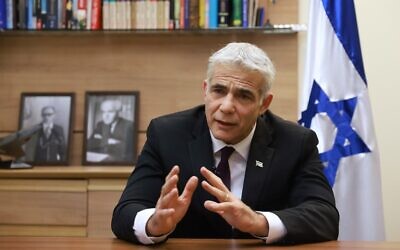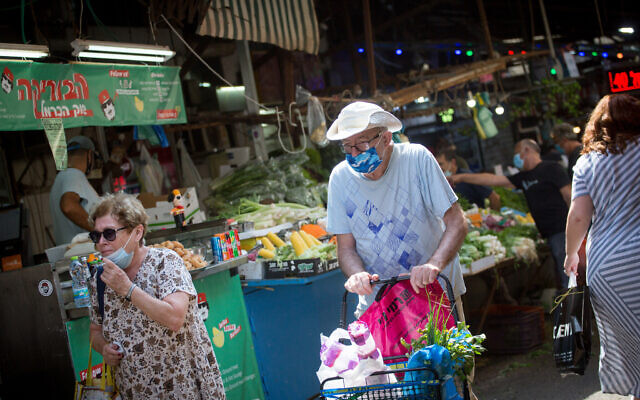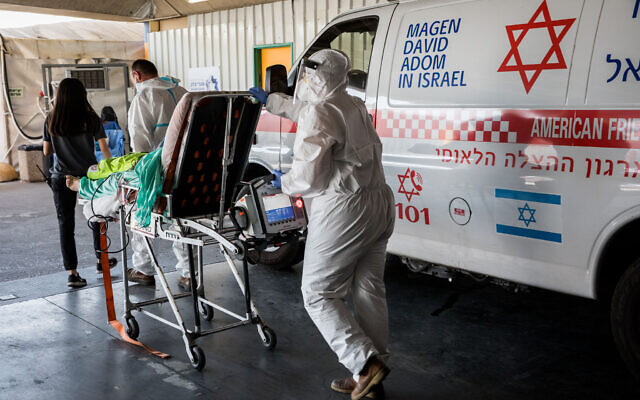Health Minister Yuli Edelstein on Thursday defended the government’s lockdown plan against a barrage of criticism and said the restrictions could be tightened further or extended, while imploring Israelis to observe the rules that are set to come into effect on Friday afternoon.
“I am not inclined to lie or deceive the public,” he told reporters. “It’s possible that it will take time, or that we will need to tighten the lockdown until we see a drop in infections.”
Israel is poised to enter a sweeping, open-ended nationwide closure ahead of the Rosh Hashanah holiday, which officials have said will last at least three weeks, while indicating it would last longer if the soaring virus rates aren’t brought down.
Most ministers voted Wednesday night to okay a roster of new restrictions that will prohibit people from traveling more than 500 meters from their home, along with a list of exceptions. The rules are still subject to the approval of the Knesset’s Constitution, Justice and Law Committee.

Clalit Health care workers take test samples of Israelis in a drive through complex to check if they have been infected with the coronavirus, in Lod, on September 17, 2020.(Yossi Aloni/FLASH90)
The rules have faced opposition from religious and ultra-Orthodox Jews because it will impact prayer during the High Holidays, from business owners because of the loss in trade, and from the general public because the closure of the education system will force many parents to miss work as they stay home to care for young children. The lockdown comes after Israel has seen over 5,000 daily virus cases this week.
Opposition lawmakers and some health experts have come down hard on the lockdown.
“In about 40 hours, the people responsible for the terrible failure in dealing with the coronavirus are putting us all under house arrest,” tweeted the leader of the opposition, Yair Lapid. “They themselves don’t believe it will help. The lockdown is an admission that they’ve given up, are helpless. We are paying the price.”

Opposition leader Yair Lapid of Yesh Atid-Telem at his office in the Knesset, Jerusalem, on September 14, 2020. (Emmanuel DUNAND/AFP)
Yisrael Beytenu leader Avigdor Liberman — who has previously urged Israelis not to listen to the health regulations — said the lockdown was “illogical.”
“I don’t believe the government and I don’t trust it,” he told the Kan public broadcaster on Thursday morning. “It’s illogical, and where there is no logic behind decisions, you create a crisis of trust. Therefore, I said, we must use our common sense and not rely on the government.”
“I didn’t call for a rebellion, but rather for common sense,” added Liberman. “If an expert says he doesn’t understand the government’s regulations, how am I supposed to understand them?”
President Reuven Rivlin, in a primetime address to the nation on Wednesday night, also lamented the government’s mixed messaging on the pandemic.
And Tel Aviv Mayor Ron Huldai condemned the government’s “schlemiel [incompetent] leadership,” in an interview with Army Radio on Thursday.

Israelis wear protective face masks at the Carmel market in Tel Aviv, September 16, 2020. (Miriam Alster/FLASH90)
Experts have also criticized the plan, with doctors union chief Hagai Levine calling it the “stupidest and most hazardous solution.”
Former Health Ministry director general Gabi Barbash, speaking to Channel 12 on Wednesday night, predicted the policy would not successfully drive down infection rates.
“If you’re gonna do a lockdown, you have to lock it down completely,” he said.
But the health minister on Thursday insisted there would be time, later, for “soul searching.”
“There are two options — to focus more and more on loopholes and mistakes, or to start fixing things. I choose to fix it. After we get out of this difficult situation we’re all in, there will be a lot of time for soul-searching. Right now, we’re at war, a war for the wellbeing of our citizens,” Edelstein told reporters.

Israelis wear protective face masks at the Carmel market in Tel Aviv, September 16, 2020. (Miriam Alster/FLASH90)
“I would suggest that everyone ask themselves what they can personally do to ensure these restrictions are successful, and together we will see different infection rates,” he said. “I know the situation is not simple and it’s much easier to blame the government and other people, but without the cooperation of the entire public, we have no way to succeed.”
Edelstein said the lifting of the lockdown would be gradual.
“We will decide to release it according to the situation and I am telling you right now there won’t be one day in which we all sigh in relief and lift everything,” he said. “The exit will be gradual, there is a whole plan.”
“We’re all in the same boat,” he continued. “If we observe the simple rules and restrictions and we don’t look for loopholes, while keeping the basic regulations of mask-wearing and social distancing, we have a chance of succeeding together.”

Magen David Adom workers wearing protective clothing outside the coronavirus unit at Shaare Zedek hospital in Jerusalem on September 14, 2020. (Nati Shohat/Flash90)
Speaking at the press briefing, Health Ministry Director General Chezy Levy said he was “pained” by the lockdown, but said there was no alternative to relieve the strain on the healthcare system.
On Wednesday, Edelstein and his deputy Yoav Kisch warned that the lockdown could not be expected to bring a significant drop in daily cases, but was hoped to at least stop the rate of increase.
Kisch said that when the figure is brought down to 1,000 new cases a day the government will be able to consider lifting some restrictions.
Israel has seen virus cases surge in recent weeks, giving it one of the highest infection rates per capita in the world. On Tuesday, it hit an all time high of around 5,500, but on Wednesday dropped back down to 4,546 new cases, according to initial Health Ministry data released Thursday.
The figure is still far higher than the 1,000 daily cases the Health Ministry is aiming for before it will consider lifting some of the lockdown measures that will see movement restricted, leisure sites closed, and the education system shuttered, among other limitations.
Authorities also lowered the death toll by two, to 1,163, without offering an explanation.
Over 1,200 people are hospitalized with the virus, and a record 579 patients were listed in serious condition, according to Health Ministry figures.
Since the start of the pandemic 172,322 people have been diagnosed with COVID-19, or nearly 2 percent of the population.
Related posts:
Views: 0
 RSS Feed
RSS Feed

















 September 17th, 2020
September 17th, 2020  Awake Goy
Awake Goy  Posted in
Posted in  Tags:
Tags: 
















